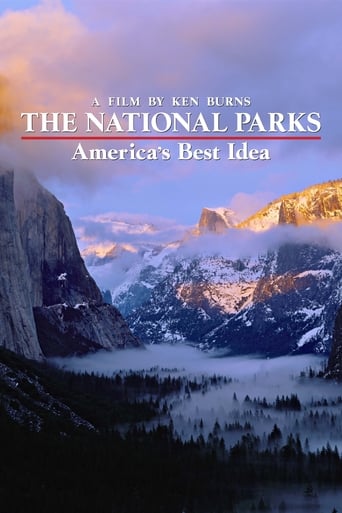peter_viney
I had no desire to return to the US until I saw this documentary. Whilst I loathe what most of America stands for, (money, guns, greed and religious fervour.....yes, I'm generalising), I do say I admire the appreciation and position National Parks hold in the American psyche. This documentary is a reflection of that position and is beautifully told. I am a fan of the way Burn's tells his stories. I find them simple, poignant and seamlessly told. Burns is a master craftsman and while many may criticise his condemnation of American action at times, I feel he is trying to say - let's not repeat the mistakes of our forefathers by forgetting what has gone before.As for John Muir, Teddy Roosevelt and Co., their contributions should, and have been celebrated appropriately. I have since returned to the US and been to three National Parks. And to Ken Burns, I am grateful for the fact I did.
imdbdood
"The knapsack of custom falls off his back with the first step he makes into these precincts. Here is sanctity which shames our religions, and reality which discredits our heroes. Here we find nature to be the circumstance which dwarfs every other circumstance, and judges like a god all men that come to her."-A quote of Ralph Waldo Emerson in the movieWhile there is no comparison to actually being in nature, the ideas that are presented in this masterpiece of a documentary are so new and refreshingly different to the common non-nature-goer that it can't help but bring the viewer, thankfully, away from their usual rat race-like trance and rhythm to a realization of a greater good and majestic context of reality.What a beautiful and powerful reminder of what belongs to all us and what all of us, in turn, belong to!
ajm64
The scenery on a big HD TV rates a "7", but the horrendous talking heads and the complete one-sidedness (John Muir is a God, Pinchot is the Devil) viewpoint of the program rates a "1".The pacing was just awful. Realizing that Yosemite and Yellowstone are, arguably, the most important National Parks, way too much time and footage was spent on these two spots and far too little was spent on parks such as Isle Royale and the Florida Everglades, to name two of many parks that were given the short shrift.Further, it was jarring to switch from the beautiful scenery to the awful, pedantic and hard to watch commentators. Particularly annoying was talking bobble head William Cronon, who's constant head shaking was reminiscent of the girl in the clip from Gumnaam that's at the beginning of Ghost World (check it out on youtube). Carl Pope of the Sierra Club, with his grating voice, did nothing to further his organization's cause. Revenge of the Nerds came to mind in watching these commentators.Also, the overly dramatic, painfully slow reading of many boring letters did little to help the narrative.I really wanted to like this. I believe that the National Parks are very important, but this dreadful waste of 12 hours did nothing for this viewer.
pery-1
The good: The historical information about the early years, about John Muir, Mather, Rockefeller and the railroads. Coverage of the tension between nature-use or "sanctuary vs. tourist resort". The fights to save various areas and their incorporation into the parks, to prevent spoilage of the parks, and the move to save predators, such as the reintroduction of wolves. The beautiful nature photography, and the historical photos.The bad: Too many talking heads, such as creepy William Cronon. Peter Coyote has been overused as a narrator, and his voice here is too pretentious and sanctimonious. Too many tedious descriptions of traveler impressions of parks. Too many statements about values of wildness which say or imply they can only be found in national parks.The ugly: The violins and weepy sentimentality. Break out the Kleenex! The phony religious and patriotic sentiment, such as the early parts about how the parks are primarily a place to worship a god. Later this becomes a claim it's the patriotic way to be part of America. Too much use of the Lincoln Memorial. Later for example, we get "We tend to put our highest ideals, our highest dreams in our national parks, therefore they function like consciences" - they improve your relation with your fellow man. Gimme a break! I love the National Parks. I really like several of Burn's productions, but was bored by "The War". This is almost that bad.Here is an example of a great presentation on the same subject, in a specific place: http://www.bigcypressswamp.org/bcs/home.html Elam Stoltzfus knows how to do it right.



